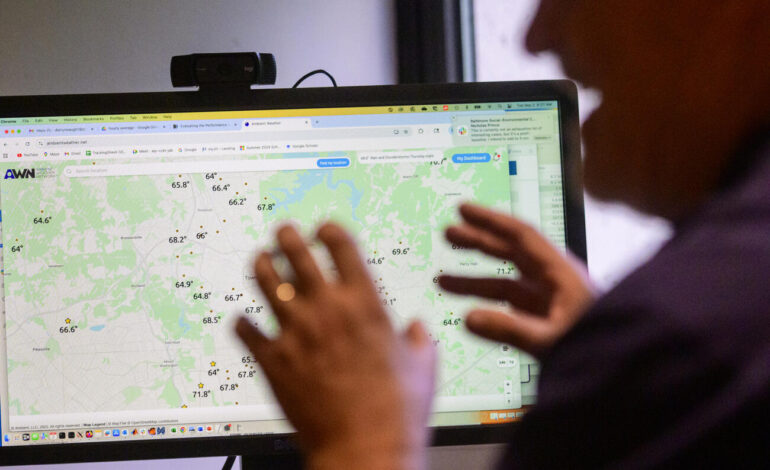Federal Funding Cuts Threaten Vital Environmental Research in Baltimore

A recent decision by the federal government to withdraw funding has jeopardized critical environmental health research in Baltimore, raising alarms among scientists and community advocates. The Department of Energy (DOE) has defunded a significant project led by Benjamin Zaitchik, a professor of Earth and planetary sciences at Johns Hopkins University, which aimed to address the impacts of extreme weather on urban areas.
Zaitchik’s project, known as the Baltimore Social-Environmental Collaborative, received a five-year grant worth $25 million. This initiative sought to explore how rising temperatures and severe weather events affect not just Baltimore but also cities like Chicago, Beaumont-Port Arthur in Texas, and Phoenix. The research involved collaboration among universities, utility companies, and community organizations to develop solutions for environmental health challenges. However, in March 2024, Zaitchik learned that funding would be cut in the fourth year, with complete defunding for the fifth year.
“This was not just a loss for our research but a disservice to the communities that rely on this work,” Zaitchik expressed, highlighting the impact on students and local residents. The project aimed to address pressing issues caused by climate change, including flooding and pollution, which disproportionately affect low-income neighborhoods.
The trend of defunding environmental health research is not isolated to Baltimore. According to investigations by the Columbia University Sabin Center for Climate Change Law, numerous federally funded projects have faced termination or significant cuts in recent months. These actions coincide with a broader rollback of climate-related policies, including potential plans to revoke the 2009 “endangerment finding,” which allows the Environmental Protection Agency (EPA) to regulate greenhouse gas emissions.
Zaitchik warned that such a reversal could lead to increased public health risks, particularly among vulnerable populations living near industrial areas. The loss of funding also hampers the ability to train new scientists and conduct necessary research that informs public policy and community health initiatives.
The Baltimore Social-Environmental Collaborative was part of a larger DOE initiative called the Urban Integrated Field Lab. It aimed to gather data on how extreme weather affects energy, water, and economic sectors in urban settings. Zaitchik’s team worked alongside institutions like Morgan State University and Pennsylvania State University, but the funding cuts have left many in the field concerned about the future of urban environmental science.
Zaitchik’s colleague, Darryn Waugh, also a professor at Johns Hopkins, emphasized the implications of the defunding on data collection efforts. Waugh’s work involved setting up weather-monitoring stations across Baltimore to track temperature, humidity, and pollution levels. He noted the critical need for comprehensive data to prepare cities for increasingly severe weather events. “Cities can’t plan effectively without the necessary data,” Waugh said.
The situation is further complicated by recent setbacks in other related research initiatives. Waugh, who also leads a $1.5 million NASA grant focused on air pollution in low-income neighborhoods, reported that his funding was halted due to its environmental justice focus. This reflects a broader federal directive issued in January 2024 that ceased all environmental justice-related efforts in the United States.
Other research at Johns Hopkins has faced similar challenges. Keeve Nachman, a professor in environmental health and engineering, reported the cancellation of an EPA grant intended to study biosolids—treated sewage sludge used as fertilizer. Nachman noted the health risks associated with unregulated chemicals in biosolids, emphasizing the need for continued research in this area.
As researchers confront these funding challenges, the broader implications for public health and environmental policy become increasingly concerning. Zaitchik and Waugh lament the shortsightedness of cutting funding in the face of escalating climate challenges. “We are rushing into hazards without the data needed to prepare,” Zaitchik stated.
The ongoing cuts not only threaten vital research but also compromise the ability to respond effectively to the growing environmental crises facing cities across the United States. With scientific inquiry stifled, the future of urban environmental health hangs in the balance.






